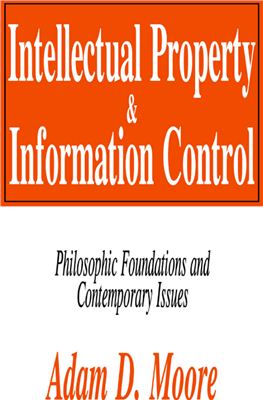Издательство Transaction Publishers, 2001, -267 pp.
This work contains numerous arguments, sketches, views, and theories and not all are central to the main thesis. I have tried to make the model of intellectual and intangible property presented in these pages accessible while maintaining a fair amount of rigor and depth. I thus skirt the line of boring the expert and overwhelming the novice. My hope is that I have done neither.
After gaining the overview offered in chapter 1, the reader who wishes to move rapidly may want to skim or omit certain sections or chapters. Chapters 3-6 are the argumentative core of the book while chapters 7-11 contain applications of the theory. Sections of chapters are appropriately titled so that the reader can quickly surmise if skimming or omission would be appropriate. For example, experts in moral theory may want to skip the second section of chapter 3 entitled A General Overview of Utilitarian Theory while those well versed in intellectual property law (copyrights and patents) may want to omit the first few sections of chapter 2.
The claim that there is room for words on subjects other than last words is certainly true of this work. I do not pretend to offer a complete theory that is unassailable and neatly packaged — the moral, legal, and political issues discussed herein are resistant to easy answers. What you will find is an intuitive model of intangible property that is both clearly presented and well reasoned. The tensions between intellectual property, information access, privacy, free speech, and accountability have been highlighted with the coming of the networked world. My hope is that this work will add to what has become a lively area of philosophical debate.
Introduction and Overview
The Domain of Intellectual Property
Against Rule-Utilitarian Intellectual Property
A Pareto-Based Proviso on Original Acquisition
Toward a Lockean Theory of Intellectual Property
Justifying Acts, Systems, and Institutions
A New Look at Copyrights, Patents, and Trade Secrets
Intangible Property: Privacy, Power, and Information Control
Employee Monitoring, Nondisclosure, Agreements, and Intangible Property
Owning Genetic Information and Gene Enhancement Techniques
Information Control and Public Policy: The Encryption Debate
This work contains numerous arguments, sketches, views, and theories and not all are central to the main thesis. I have tried to make the model of intellectual and intangible property presented in these pages accessible while maintaining a fair amount of rigor and depth. I thus skirt the line of boring the expert and overwhelming the novice. My hope is that I have done neither.
After gaining the overview offered in chapter 1, the reader who wishes to move rapidly may want to skim or omit certain sections or chapters. Chapters 3-6 are the argumentative core of the book while chapters 7-11 contain applications of the theory. Sections of chapters are appropriately titled so that the reader can quickly surmise if skimming or omission would be appropriate. For example, experts in moral theory may want to skip the second section of chapter 3 entitled A General Overview of Utilitarian Theory while those well versed in intellectual property law (copyrights and patents) may want to omit the first few sections of chapter 2.
The claim that there is room for words on subjects other than last words is certainly true of this work. I do not pretend to offer a complete theory that is unassailable and neatly packaged — the moral, legal, and political issues discussed herein are resistant to easy answers. What you will find is an intuitive model of intangible property that is both clearly presented and well reasoned. The tensions between intellectual property, information access, privacy, free speech, and accountability have been highlighted with the coming of the networked world. My hope is that this work will add to what has become a lively area of philosophical debate.
Introduction and Overview
The Domain of Intellectual Property
Against Rule-Utilitarian Intellectual Property
A Pareto-Based Proviso on Original Acquisition
Toward a Lockean Theory of Intellectual Property
Justifying Acts, Systems, and Institutions
A New Look at Copyrights, Patents, and Trade Secrets
Intangible Property: Privacy, Power, and Information Control
Employee Monitoring, Nondisclosure, Agreements, and Intangible Property
Owning Genetic Information and Gene Enhancement Techniques
Information Control and Public Policy: The Encryption Debate

